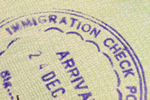Is expat travel overseas dead in the water?

Is expat travel overseas dead in the water?
First introduced as a measure to transport trapped travellers and expats back to their home countries, air corridors are now being mooted as one way to keep international movement alive as well as providing struggling carriers an escape from looming bankruptcy. Whether it’s the answer to everyone’s prayers or just a distraction will become evident when quarantines and entry bans are taken into consideration.
For those expatriating for business reasons, air travel between countries is essential and has ground to a halt since the pandemic took hold worldwide. The lack of freedom to come and go has also all but destroyed a number of countries’ tourism industries, although the total effect on the economies concerned has yet to emerge. Right now, a patchy destination network is being constructed, including the reality of quarantines and virus tests.
One of the first to open is between South Korea and China, both countries with already surfacing second waves of the virus. It’s tightly controlled, linking Seoul with 10 Chinese regions including Shanghai, and is being equally tightly watched for flaws in its system. In addition, the three Baltic countries of Lithuania, Latvia and Estonia have now lifted restrictions on travel within their corridor, whilst New Zealand and Australia are now considering a similar move. In an attempt to save the devastated airline industry, a few international flights are now open, but the risk of virus tests and long quarantines isn’t an attraction.
Basically, the coronavirus is airlines’ worst, totally unpredictable nightmare, with many popular tourism and expatriate professional destinations desperate to deflect what’s turning into a world recession. Unfortunately, no one country is in agreement with any other as to the measures necessary to halt or even limit the spread of the virus across borders. China’s late March banning of the vast majority of foreigners from entry was eased when flights from Korea were allowed in, but the hoops they had to jump including a virus test, two weeks’ screening, a two-day lockdown in China and a second blood test.
Right now, business travellers could be forgiven for preferring to work from home and tourists would almost certainly choose another destination with a better record for beating the virus. Even so, Korea’s fast-track business programme is tempting expat professionals to take a chance. Individual countries are going it alone on who to let in and how, making it almost impossible to plan a business trip or even a weekend away.
Spain, the UK, most of Europe and several Southeast Asian countries are all working to different guidelines, and travelling to the USA is a waste of time and a risk to life. Unless passenger arrival treatment is standardised, travel between any country is a gamble, with the airline industry as a whole believing demand for their services is now dying if not already dead in the water.
Related Stories:
- Is Kuwaitization the unintended result of the oil price crash? - July 20, 2020
- Expats in Malaysia still banned from overseas travel - July 17, 2020
- HSBC Asia to cut back on internal expat relocations - July 16, 2020
- Tips on integrating for newly-arrived expats - July 15, 2020
Latest News:
- Tips on a trouble-free relocation as an expat overseas - July 20, 2020
- Expats find peace in the covid-19 refuge of Dahab town - July 20, 2020
- Is Kuwaitization the unintended result of the oil price crash? - July 20, 2020
- Expats unhappy abut changes to Korean points-based visa system - July 17, 2020
- Chiang Mai and Bangkok no longer bargain locations for expats - July 17, 2020
- Expats in Malaysia still banned from overseas travel - July 17, 2020
- Vietnam welcomes expats to its safe, affordable lifestyle - July 16, 2020
- Asian tiger economies reach out to expats in Hong Kong - July 16, 2020
- HSBC Asia to cut back on internal expat relocations - July 16, 2020
- Tips on integrating for newly-arrived expats - July 15, 2020


